人教版九年级全册Unit 3 Could you please tell me where the restrooms are-Section B(2a~3b)课件(共18张PPT)
文档属性
| 名称 | 人教版九年级全册Unit 3 Could you please tell me where the restrooms are-Section B(2a~3b)课件(共18张PPT) | 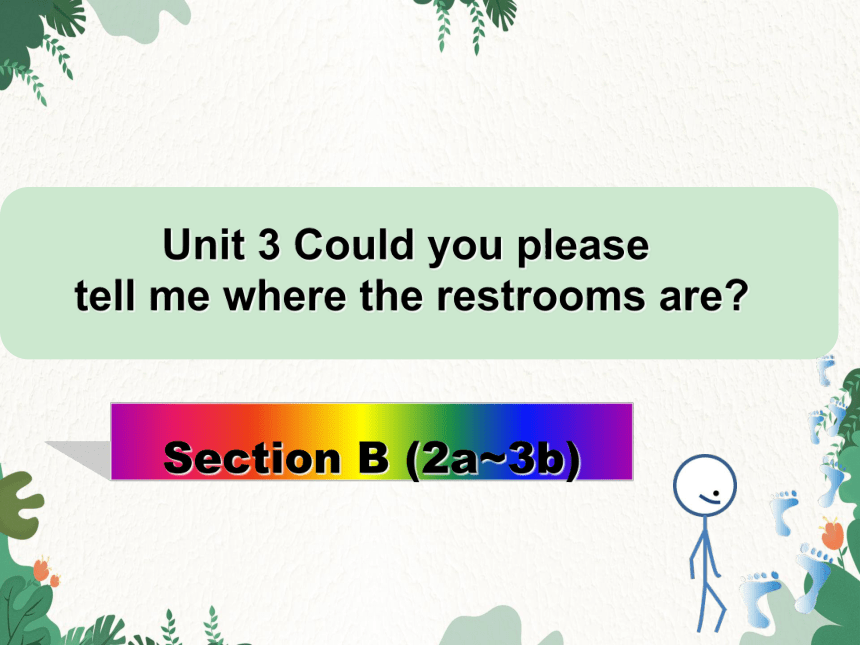 | |
| 格式 | ppt | ||
| 文件大小 | 3.7MB | ||
| 资源类型 | 教案 | ||
| 版本资源 | 人教新目标(Go for it)版 | ||
| 科目 | 英语 | ||
| 更新时间 | 2022-10-04 11:14:18 | ||
图片预览

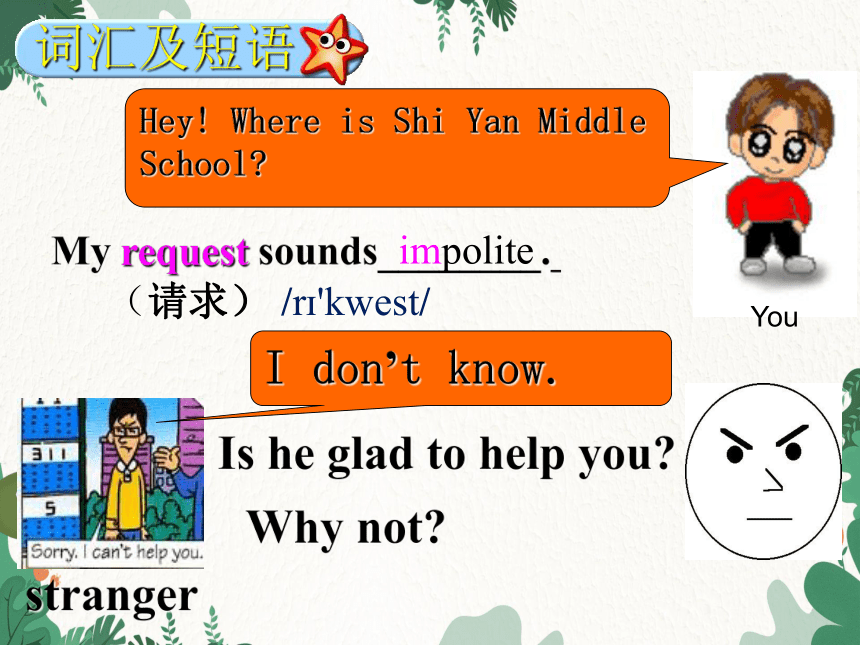
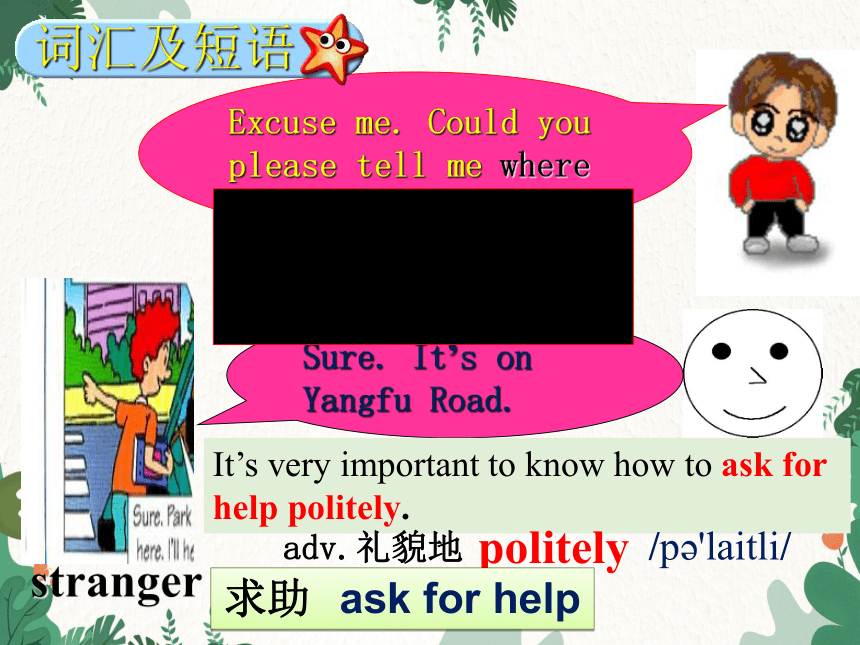
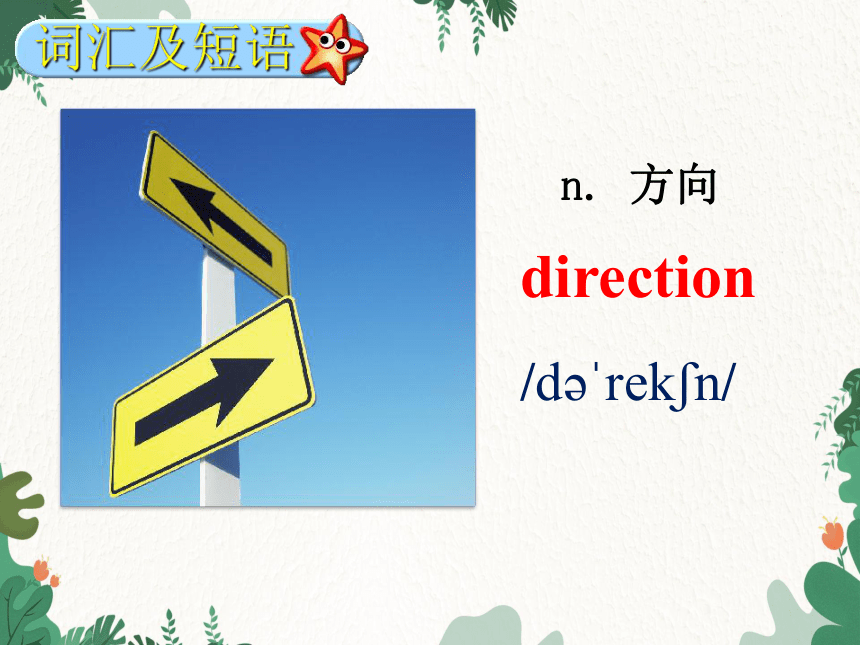
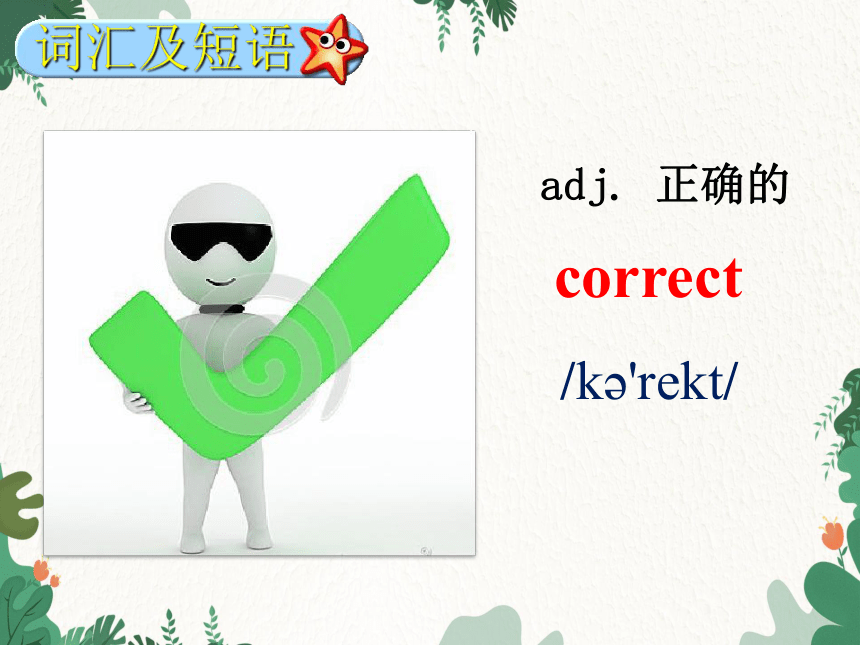
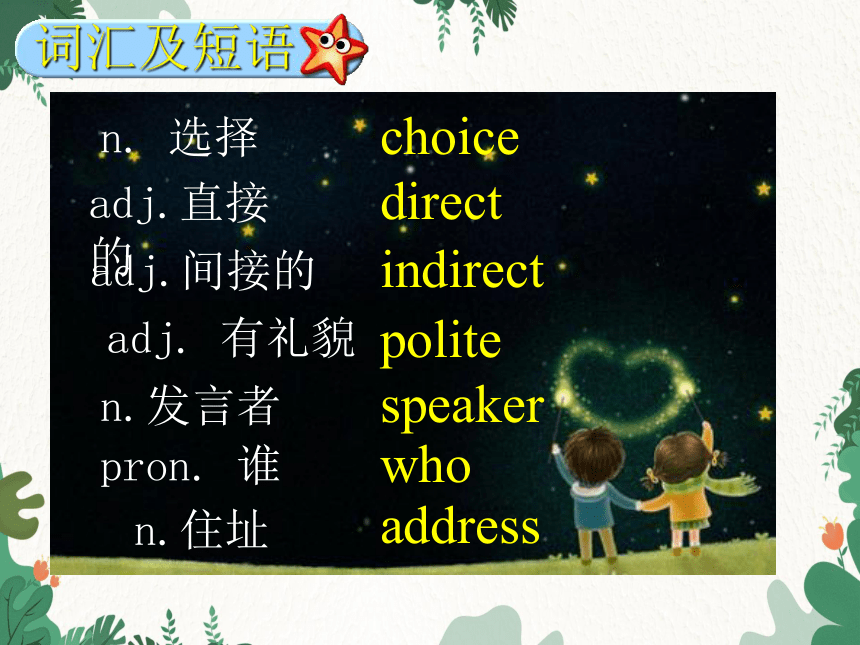
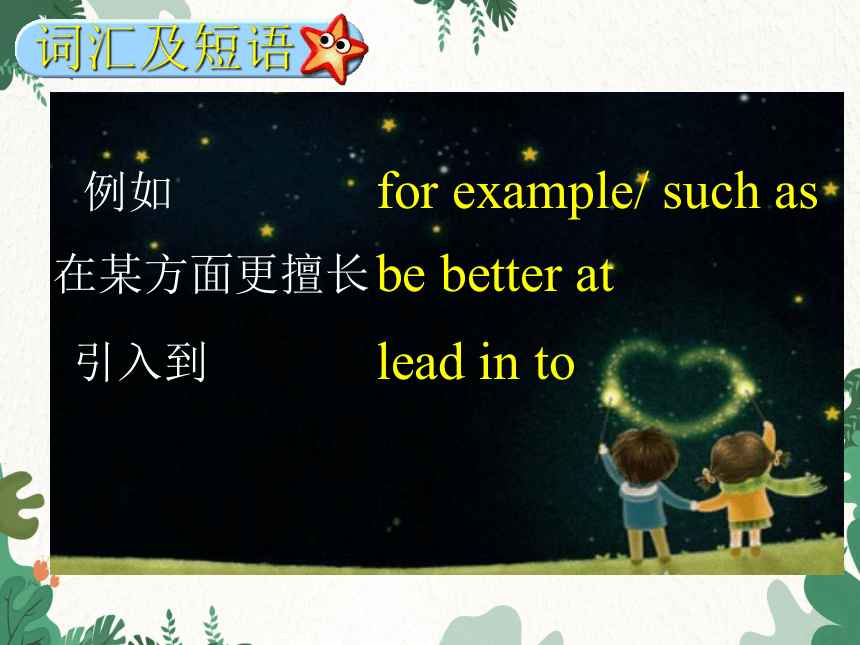
文档简介
(共18张PPT)
Unit 3 Could you please
tell me where the restrooms are
Section B (2a~3b)
词汇及短语
Hey! Where is Shi Yan Middle School
stranger
Is he glad to help you
Why not
I don’t know.
My request sounds________.
impolite
(请求) /r 'kwest/
You
Excuse me. Could you please tell me where Shi Yan Middle School is
Sure. It’s on Yangfu Road.
Polite
stranger
词汇及短语
It’s very important to know how to ask for help politely.
politely
/p 'laitli/
adv.礼貌地
求助 ask for help
direction
/d rek n/
n. 方向
词汇及短语
correct
/k 'rekt/
adj. 正确的
词汇及短语
词汇及短语
choice
n. 选择
direct
adj.直接的
indirect
adj.间接的
polite
adj. 有礼貌
speaker
n.发言者
who
pron. 谁
n.住址
address
词汇及短语
for example/ such as
例如
be better at
在某方面更擅长
lead in to
引入到
课文导学
Where do you need to make polite requests
When we don’t know the way to some place.
When we ask help from others.
Read the article and underline the topic sentence for each paragraph.
2b
1. We need to know how to be polite by being less direct—or more indirect—when we ask for help.
2. Good speakers of English change the way they talk when they speak with different people in different situations.
3. Usually polite questions are longer and include expressions such as “Could you please… ” or “Can I ask… ”
4. It’s important to learn how to use proper language.
Fill all the direct question and polite requests from the passage.
2c
Direct questions Polite requests
1.Where are the restrooms
1.Could you tell me where the restrooms are
2.When is the school trip
2.Excuse me, Mr. West. Do you know when the school trip is
3. Where’s the post office
3. Pardon me, could you please tell me where to park my car
2d
3a
Write a polite letter to the school asking for the information you want to know. Use your notes in 3a.
3b
Use the following expressions to help you:
My name is…and I’m from
I’ll be coming to your school for…
I’d like to know about…
I would like to thank you for…
I’m looking forward to your reply.
1. It’s important to know how to ask for help politely.
知道如何礼貌地请求帮助是很重要的。
① ask for help 求助
ask sb. for help. 求助某人
② politely adv. 有礼貌地,它的形容词为polite,反义词为impolitely
有些形容词加前缀im构成反义词:
possible—impossible
polite—impolite
politely—impolitely
……
形容词加ly构成副词:
polite—politely quick—quickly
healthy—healthily real—really
……
Key points
2. Both are correct, but the first one sounds less polite.
两种说法都正确,但是第一个听起来没那么礼貌。
①Less+形容词或副词,构成降级比较形式,意为“不那么,稍许不…”
eg:他的第二部分影片就不那么有趣。
His second movie is less interesting.
②Less 后面常接than,引入比较对象。
eg:有些品种的狗不如另一些那么友善。
Some kinds of dogs are less friendly than others.
我并不那么生气,更多的是惊讶。
I was less angry than surprised.
Key points
3. It might seem more difficult to speak politely than directly.
看起来说得客气比起说得直白要更加困难些。
①It是“形式主语”,真正主语是动词不变式短语。
eg:能说一门外语是非常有用的。
It’s very helpful to be able to speak a foreign language.
完成这个项目花了我三天时间。
It took me three days to finish the project.
②might 表达一种可能性及推测的不确定性,表示“有可能,也许会”。
eg:火车也许会晚几个小时。
The train might be a few hours late.
吉娜可能走不了。
Gina might not be able to go.
Key points
1.知道如何让礼貌的求助很重要。
It’s important to know _____ ___ how to ask for help _______.
2.他们使用的词语取决于他们和谁讲话或者他们彼此有多熟。
The expressions they use might ______ ___ _____ they are speaking to or _____ _____ they know each other.
3.有时候我们甚至要花时间引入到一个请求。
Sometimes we even need to ______time ______ ___ ___a request.
4.这将会帮助你更擅长英语,或者其他任意一种你希望讲的语言。
This will also help you become ______ ___ English, or _____ _____ language you wish to speak.
how to
Exercises
politely
depend on whom
how well
spend
leading in
to
better at
any other
Unit 3 Could you please
tell me where the restrooms are
Section B (2a~3b)
词汇及短语
Hey! Where is Shi Yan Middle School
stranger
Is he glad to help you
Why not
I don’t know.
My request sounds________.
impolite
(请求) /r 'kwest/
You
Excuse me. Could you please tell me where Shi Yan Middle School is
Sure. It’s on Yangfu Road.
Polite
stranger
词汇及短语
It’s very important to know how to ask for help politely.
politely
/p 'laitli/
adv.礼貌地
求助 ask for help
direction
/d rek n/
n. 方向
词汇及短语
correct
/k 'rekt/
adj. 正确的
词汇及短语
词汇及短语
choice
n. 选择
direct
adj.直接的
indirect
adj.间接的
polite
adj. 有礼貌
speaker
n.发言者
who
pron. 谁
n.住址
address
词汇及短语
for example/ such as
例如
be better at
在某方面更擅长
lead in to
引入到
课文导学
Where do you need to make polite requests
When we don’t know the way to some place.
When we ask help from others.
Read the article and underline the topic sentence for each paragraph.
2b
1. We need to know how to be polite by being less direct—or more indirect—when we ask for help.
2. Good speakers of English change the way they talk when they speak with different people in different situations.
3. Usually polite questions are longer and include expressions such as “Could you please… ” or “Can I ask… ”
4. It’s important to learn how to use proper language.
Fill all the direct question and polite requests from the passage.
2c
Direct questions Polite requests
1.Where are the restrooms
1.Could you tell me where the restrooms are
2.When is the school trip
2.Excuse me, Mr. West. Do you know when the school trip is
3. Where’s the post office
3. Pardon me, could you please tell me where to park my car
2d
3a
Write a polite letter to the school asking for the information you want to know. Use your notes in 3a.
3b
Use the following expressions to help you:
My name is…and I’m from
I’ll be coming to your school for…
I’d like to know about…
I would like to thank you for…
I’m looking forward to your reply.
1. It’s important to know how to ask for help politely.
知道如何礼貌地请求帮助是很重要的。
① ask for help 求助
ask sb. for help. 求助某人
② politely adv. 有礼貌地,它的形容词为polite,反义词为impolitely
有些形容词加前缀im构成反义词:
possible—impossible
polite—impolite
politely—impolitely
……
形容词加ly构成副词:
polite—politely quick—quickly
healthy—healthily real—really
……
Key points
2. Both are correct, but the first one sounds less polite.
两种说法都正确,但是第一个听起来没那么礼貌。
①Less+形容词或副词,构成降级比较形式,意为“不那么,稍许不…”
eg:他的第二部分影片就不那么有趣。
His second movie is less interesting.
②Less 后面常接than,引入比较对象。
eg:有些品种的狗不如另一些那么友善。
Some kinds of dogs are less friendly than others.
我并不那么生气,更多的是惊讶。
I was less angry than surprised.
Key points
3. It might seem more difficult to speak politely than directly.
看起来说得客气比起说得直白要更加困难些。
①It是“形式主语”,真正主语是动词不变式短语。
eg:能说一门外语是非常有用的。
It’s very helpful to be able to speak a foreign language.
完成这个项目花了我三天时间。
It took me three days to finish the project.
②might 表达一种可能性及推测的不确定性,表示“有可能,也许会”。
eg:火车也许会晚几个小时。
The train might be a few hours late.
吉娜可能走不了。
Gina might not be able to go.
Key points
1.知道如何让礼貌的求助很重要。
It’s important to know _____ ___ how to ask for help _______.
2.他们使用的词语取决于他们和谁讲话或者他们彼此有多熟。
The expressions they use might ______ ___ _____ they are speaking to or _____ _____ they know each other.
3.有时候我们甚至要花时间引入到一个请求。
Sometimes we even need to ______time ______ ___ ___a request.
4.这将会帮助你更擅长英语,或者其他任意一种你希望讲的语言。
This will also help you become ______ ___ English, or _____ _____ language you wish to speak.
how to
Exercises
politely
depend on whom
how well
spend
leading in
to
better at
any other
同课章节目录
- Unit 1 How can we become good learners.
- Section A
- Section B
- Unit 2 I think that mooncakes are delicious!
- Section A
- Section B
- Unit 3 Could you please tell me where the restroom
- Section A
- Section B
- Unit 4 I used to be afraid of the dark.
- Section A
- Section B
- Unit 5 What are the shirts made of?
- Section A
- Section B
- Review of Units 1-5
- Unit 6 When was it invented?
- Section A
- Section B
- Unit 7 Teenagers should be allowed to choose their
- Section A
- Section B
- Unit 8 It must belong to Carla.
- Section A
- Section B
- Unit 9 I like music that I can dance to.
- Section A
- Section B
- Unit 10 You're supposed to shake hands.
- Section A
- Section B
- Review of Units 6-10
- Unit 11 Sad movies make me cry.
- Section A
- Section B
- Unit 12 Life is full of the unexpected
- Section A
- Section B
- Unit 13 We're trying to save the earth!
- Section A
- Section B
- Unit 14 I remember meeting all of you in Grade 7.
- Section A
- Section B
- Review of Units 11-14
